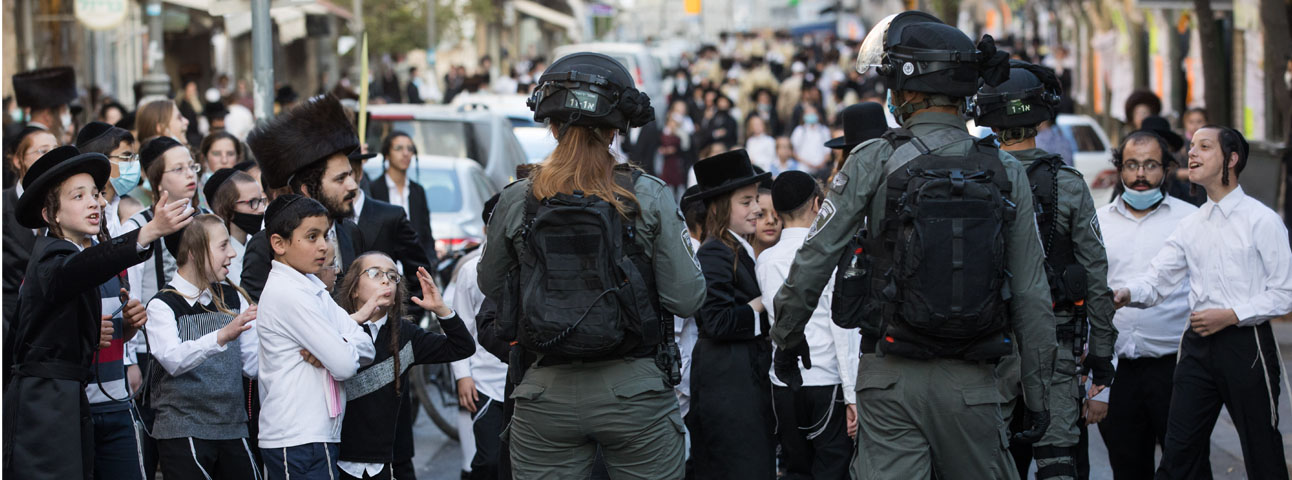What Do You Do When there’s a Hole in the Boat?
The handwriting was on the wall. Since the founding of the State, rabbis have served as middlemen between the government and the ultra-Orthodox. We must acknowledge that this approach has failed miserably.

Flash 90
The recent data revealing that 40% of all confirmed cases of COVID-19 are members of the ultra-Orthodox sector impels all of us, and not just the ultra-Orthodox, to engage in serious self-scrutiny and soul-searching.
On the one hand, a fundamental principle of a pluralistic society respectful of human rights is honoring a minority’s right to its religion, its culture, and its language. Its members have a right to live according to their own values and culture, to conduct public prayers, and to educate their children as they see fit.
On the other hand, these rights, like all others, are not absolute. There are times when the minority’s autonomy must take a back seat in order to protect the citizenry as a whole.
Israel, like every other country, is battling the coronavirus pandemic. Extremely harsh restrictions on freedom of movement, on conducting business, and on the right to enjoy cultural events have been imposed on the public in recent weeks, in an attempt to curtail the spread of contagion and to ensure that it will be possible to provide proper treatment for those who contract the virus. From the start, the authorities defined certain exceptions to these restrictions in order to permit public prayer and Torah study in ultra-Orthodox yeshivot. In the last few days we have seen that even the lenient rules set for services on Yom Kippur were brazenly flouted by many groups in the community, though not by all of the ultra-Orthodox.
We are not referring here to the behavior of individuals who decided to do whatever they please. And we must note that there are lawbreakers in every sector of the public. However, as the photos of the buses transporting yeshiva students home at the height of the strict lockdown reveal, in this case we are dealing with organized activity. According to Major Gen. (res.) Roni Numa, in charge of overseeing the battle against the pandemic in the ultra-Orthodox sector, about 10,000 yeshiva students, out of the total of 40,000, did not adhere even to the rules adapted specifically to address their needs, and did not have themselves tested for the virus before they went home on vacation. In light of the high incidence of COVID-19 among them, there is a serious fear that the disease will spread to their families and to the public at large.
This isn’t a case of a handful of people who thumbed their noses at the restrictions, but rather a conscious decision by some of the ultra-Orthodox rabbis. The problem is that the risks involved do not threaten only the followers of that rabbi. They affect the public as a whole, the same public which will have to make use of the same limited resources available in the hospitals, if there is a sharp upswing in contagion. At this point, the self-segregation of ultra-Orthodox communities comes to a halt; most of their members will not hesitate to be admitted to public hospitals for treatment, if needed.
We must acknowledge that the handwriting was on the wall. Since the founding of the State, the “professional scholars” ("toratto omannutto") deal, in its various forms, has made rabbis and yeshiva deans into middlemen between the state and the IDF on one side, and their students of draft age, on the other. A state’s sovereignty is expressed in the fact that all its laws apply to all living within its territory. However, in many matters related to the ultra-Orthodox, the state seems to have pulled back from imposing its sovereignty, and accepted the convenience of “dialogue” and “consensus” with ultra-Orthodox leadership. In the present crisis as well, the same approach seems to have been adopted—one law for citizens in general, and another--for the ultra-Orthodox, providing their rabbis agree. As we see, this approach has failed miserably.
Over the years, some have asserted that, in the name of tolerance towards the minority or in light of practical considerations, we must come to terms with the fact that young ultra-Orthodox men do not serve in the IDF and are exempted from having to do their part in rowing the national boat. But now we see that while most of us are frantically bailing the water out of the boat, many of the ultra-Orthodox are drilling holes in the hull, that may drown us all.
This situation requires a fundamental change of course—a U-turn—in the relationship between the state and the ultra-Orthodox. Developing a healthier relationship requires caution and consideration. Respect for the ultra-Orthodox lifestyle? Yes. Dialogue? That too is appropriate. The state renouncing its sovereignty and allowing rabbis to exercise unlimited power as the brokers between their flocks and the state? Absolutely not! We must put an end to this situation if we have the will to live.
The article was published in the Times of Israel.
